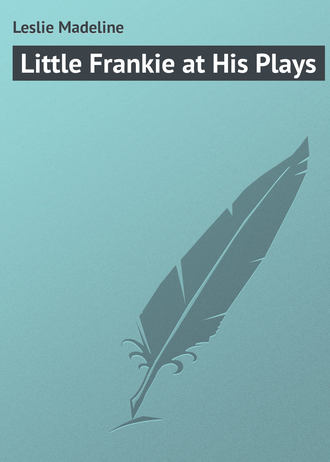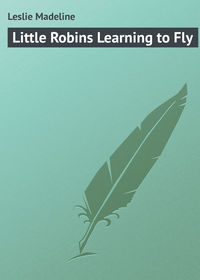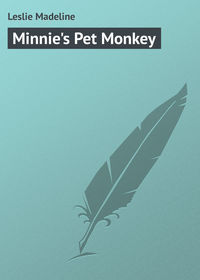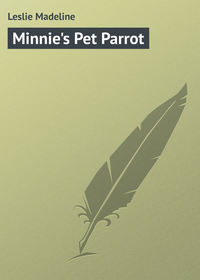
Little Frankie at His Plays
Frankie was very fond of cake, and would have liked to make his whole supper of it. But mamma knew it would make him sick. Sometimes, when he was in the kitchen, Jane gave him a piece; and one day his mother was very much pleased when he came running to her with a rich cake in his hand, fresh from the oven. "May I eat it, mamma?" he asked. "I didn't taste it without your leave."
Mamma broke off a small piece, and gave it to him, and then took him in her lap, and repeated a pretty little hymn she had learned when she was a child. I think you will like to hear it too.
"Mamma, do hear Eliza cry;She wants a piece of cake I know;She will not stir to school without;Do give her some, and let her go.""O, no, my dear; that will not do;She has behaved extremely ill;She pouts instead of minding me,And tries to gain her stubborn will."This morning, when she had her milk,She gave her spoon a sudden twirl,And tipped it over on the floor;O, she's a naughty, wicked girl!"And now, forsooth, she cries for cake;But that I surely shall refuse;For children never should objectTo eating what their parents choose."The pretty little girl who cameTo sell the strawberries here to-day,Would have been very glad to eatWhat my Eliza threw away; —"Because her parents are so poorThat they have neither milk nor meat;But gruel and some Indian cakeAre all the children have to eat."They have four little girls and boys;Mary's the oldest of the whole,And hard enough she has to work,To help her ma – poor little soul!"As soon as strawberries are ripe,She picks all day, and will not stopTo play or eat a single one,Till she has filled her basket up."Then down she comes and sells them all,And lays the money up at home,To buy her stockings and her shoes,To wear when freezing winter's come."For then she has to trudge away,And gather wood through piles of snow,To keep the little children warm,When bites the frost, and cold winds blow."And then, when she comes home at night,Hungry and tired, with cold benumbed,How she would jump to find a bowlOf bread and milk all nicely crumbed!"But she, dear child, has no such thing;Of gruel and the Indian cake,Whether she chooses it or not,Poor Mary must her supper make."Eliza, dear, will you behaveSo ill again, another day?Be cross and pert, and cry for cake,And fling your breakfast all away?""Ah, never, never, dear mamma!I'm sorry that I gave you pain;Forgive me, and I never willBe such a naughty girl again."CHAPTER VI.
FRANKIE'S ROCKING HORSE
When Frankie was between three and four years old, there were a good many words he could not pronounce distinctly. He could not say kitchen, but called it chichen; and he called sugar chucher. He could not say sing, but said ting. His papa was afraid he never would be able to pronounce them; and he took a great deal of pains to have him try to say them over and over again. He used to take Frankie on his knee, and make him sound s-s-, and then say s-sing. But Frankie always said s-ting.
One day his mamma was passing through the back hall, and she saw her little boy kneeling in a chair by the table where Jane was making bread. He was talking very earnestly, and she stopped a moment to hear what he was saying.
He was giving Jane a lesson. "Now say knife," he began. So Jane said "knife."
"No, that not wight; you must say s- knife."
Jane laughed: "knife is right," she said.
"No, no!" he repeated; "papa say s- knife; so you must say it wight."
He thought it was as well to put s- on any other word as on sing.
He was very fond of playing school, and was quite happy when Willie and Margie would be his scholars. Dinah was always set up in her chair too, and another dolly whose name was Lily Gray. Frankie would set them all before him, and then ask, "Margie, who first man?"
"Adam."
"Now, you good girl, you may go wight to your seat. Willie, who first boy?"
"Cain."
"Yes, that's wight; now you be vely till, cause I shall peach." Then he would stand in his chair and preach very loud, spreading his arms, and always closing with a long amen.
Once, when he was kneeling with his father, he thought the prayer rather long, and putting up his face, he whispered, "Say amen, papa; – can't you say amen?"
Frankie was very happy one day when his mamma told him that his aunt and cousin were coming to make them a visit. He packed all his playthings in a trunk, to have them ready for the little baby, and then went round the house telling every body that Eddie was coming to see him.
The day before they were expected, a beautiful present came for Frankie from Mr. Wallace, the same kind gentleman who had given him the silver cup.
Can you guess what it was? It was not a cup and ball, nor a top, nor an iron hoop, but a rocking horse with a carriage fastened to it large enough for him to get in it. Then there was a place for the whip, and two pairs of reins for him to drive with.
At first, Frankie stood looking at it, his eyes growing larger and larger, until papa asked, "Well, Frankie, how do you like your new horse?"
"Is it for me, papa, for mine own telf?" exclaimed the little boy, clapping his hands and dancing up and down. "O, I'm to glad!" Then raising his eyes, he said, soberly, "Tank you, Dod. Tank you vely much indeed."
His mamma had taught him that all our blessings come from God; and the dear boy wished to thank him for this new favor.
I can hardly tell you how much pleased he was with his present. He could scarcely stop riding to eat his dinner; and then had to put up the horse in the corner of the room he called the stable, and tie him very tightly to a chair, for fear he would run away. Then, before his mother noticed what he was about, he slipped from his seat, and carried his silver cup of water to the pony, and held it to his mouth to drink.
"Pony hungry," he said, when she called him back. "Pony vely hungry indeed."
When Willie and Margie came from school, mamma watched her boy, to see whether he would be generous, and allow them to share in his rides.
"O, my!" called out Willie, "how pretty it is! Let me get in."
"Yet, you may," said Frankie, stepping out of the carriage. "Here, take Dinah too. Dinah wants to wide."
While Willie was whipping the horse to make him go as fast as he could, Frankie danced up and down, every now and then calling out, "Go long, pony, go long!"
In the mean time, Margie stood awaiting her turn, hardly daring to expect that Frankie would give up his new plaything to her. Mamma was looking on too, and was very happy when he said, "There, Willie, you must get out now, cause Margie wants to wide. Top a minute, Margie; I'll fix the reins for you," he cried; and he went to the pony's head, and patted him, and said, "Whoa, sir, whoa!" just like any gentleman.
The next day, when Eddie and his mamma came, Frankie seemed very happy to share his pleasure with his little cousin. They rode away together to visit other papas and mammas, but always came back at last to the stable in the corner of the room.
Can you tell what it was made Mrs. Gray so happy, when she looked at the pretty pony? It was because her darling boy had not been selfish with it, and tried to keep it all to himself, but had liked to see others riding in it, and enjoying it too. When little boys or girls are generous and kind, then look for smiles and kisses from their mammas.
CHAPTER VII.
THE TRY COMPANY
"O mamma!" cried Willie, one day, running home from school in great haste, "the boys are going to have a little company; may I have a soldier cap and belong to it?"
Mrs. Gray sat busily at work, but she at once laid down her sewing in her lap, and thought a moment, and then she said, "I want you to belong to my company, my dear!"
"What company, mamma? Will they wear soldier caps, and jackets with red all down here, and stripes on their pantaloons?"
"Yes, they will be all dressed up with plumes and stars on their shoulders. It will be called the Try Company."
"May I have a cap too?" asked Frankie.
"Yes, any little boy may join who will agree to the rules."
"Rules, mamma," said Willie, "Do companies have rules?"
"O, yes, my dear! Soldiers always have to obey the captain; and if an enemy comes, to go and fight him."
"Shall we fight, then?" asked the boy in surprise.
"There will be one kind of fighting, my dear; but it will not be fighting with swords. You may ask all the little boys, who wish to form a company, up here after school this evening, and I will talk with them. Perhaps they will like to join my company."
Willie laughed quite heartily. "Yours, mamma! Shall you be the captain?"
"If they choose me I shall, my dear."
As soon as Willie had gone to school, Mrs. Gray began to cut long strips of colored paper and wind them into plumes. There was a very long waving one of yellow for the captain, and one of blue for the lieutenant, and twelve of pink for the soldiers. She did not think there would be more than fourteen at first. Then she cut sheets of paper, and taught Sally to form them into caps; and after they were done, she sewed the plumes on, and laid them all out on the table, which stood in the hall, so as to attract the notice of the boys when they came in from school.
Next she sent Sally to the attic for some strips of red and blue cloth. Of the red she made pretty stars to fasten on the shoulders, while nurse cut long smooth stripes to trim their jackets and pantaloons.
They had but just finished their work when a shout from Willie called mamma to the door, where she saw a company of boys awaiting her orders.
"Come in," she said, smiling at their bright, expectant faces; "come in, and we will form the company."
As they entered the hall they stopped short at sight of the beautifully plumed caps. "O mamma!" was all that Willie could say.
She led them into the dining hall, and then told them her plan. "I want to form a company of boys," she began. "It will be called the 'Try Company,' because every one belonging to it must learn to try to do things for himself. But first of all I must tell you the rules. No little boy can join my company unless he will promise not to use one naughty or vulgar word, not to tell a lie, and not to be unkind. If he has ever told lies, he must try to do so no more. Next he must try in his lessons. Sometimes the words are very long, and boys say, 'I can't learn them;' but my company will never say so.
"My boys will say, 'I'll try.' If the geography lesson is difficult, and you can't readily find the places on the maps, you will think of your pretty plumes, and say, 'I won't give up; I'll try again.'
"Then, when the sum is long, and it makes your head ache to add up four and ten and two and five, you won't mind that, but keep on trying until you succeed."
"Mother wants to know if my little brother can't join your company," asked a dear boy whose name was James; "but he don't learn sums; he is too small."
"O, yes, indeed!" said mamma; "Frankie has a cap like the rest, and your brother shall have one too, and a star on his shoulder."
"May I carry my drum?" eagerly asked Willie.
"Certainly, my dear; but wait a little. I have not told all the rules yet. My company must try, too, when they are at play. If James throws a ball, and hits John, he must try not to do so again. And if John feels a little angry, and thinks it very hard for James to hurt him, he must try to put all these naughty thoughts away, and call it an accident, and say 'I don't believe he meant to do it.' Then, if James or Willie wants to be captain, and the company choose another, James or Willie must try to be pleased and good humored about it."
"I thought you were to be captain, mother," cried Willie.
"I am afraid you would all laugh," said mamma, "to see me marching round at the head of such a troop of boys."
"We would try not to," exclaimed Willie, laughing.
Mrs. Gray laughed too; and then she said, "I want to see whether you understand about my rules; so I shall ask you a few questions. I once saw a boy sawing a stick of wood. It was a very large stick, and the saw went hard; the little fellow sat down and looked at it. 'It's too large,' said he; 'I can't get through it. I may as well give up first as last.' But presently he said, 'I'll try once more though;' and he started up, and sawed away, up and down, up and down, until the stick fell in two. Then the boy laughed and wiped his forehead, which was quite wet with perspiration, and said, 'There, I'm right glad I tried again. I never should have done it without trying.' Now tell me, could that little fellow be admitted into the Try Company?"
"Yes, ma'am, O, yes, ma'am!" answered all the boys.
"He ought to be the captain," said one.
Willie blushed, and held down his head.
"I knew another boy, who was winding some silk for his mother," said the lady. "He jerked it so much that it snarled badly. He pulled it, and twitched it, and made it worse than ever; and then he said; 'I can't do any thing with it.' When his mother came back for the silk, there it was upon the chair, so tangled up that she could not use it."
"He can't belong," called out the boys.
"I think you understand quite enough to form the company," said mamma. "Now I will put the vote. Would you all like to form a Try Company? If you would, you may hold up your hands."
Every small hand was quickly raised.
"And you promise to try, according to the rules?" said the lady.
Each little hand was raised again.
"Who is the oldest boy?" she asked.
"Sammy Lanman, ma'am."
"Then I advise you to let Sammy be the captain the first time, and then each of you take turns, until it comes down to little Frankie."
"May I run home for my brother?" asked James.
The lady stopped a moment to count the boys, and finding there were only twelve with Frankie, and that there would be caps enough for all, she said yes.
While he was gone, Willie ran to his play room for his drum, and Mrs. Gray dressed the Try Company in their new uniform, which did indeed look very fine. Then James came leading his little brother Walter; and when they were all dressed, their captain arranged them in order, and they then marched off down the yard, into the road, looking as happy as you please. Mamma and nurse stood at the door gazing after them, while Jane and Margie stood in the walk, shading their eyes and laughing heartily.
Poor Sammy, indeed, found that the office of captain was a most responsible one. His face grew very red as he perceived the younger members marching out of line, and a sharp word of rebuke rose to his lips, as little Frankie laughed aloud in his glee.
But suddenly he remembered that he had promised not to speak unkindly, and his heart beat fast as he said to himself, "Any body will know such little boys can't train very well the first time. At any rate, I'll try to keep my temper."









